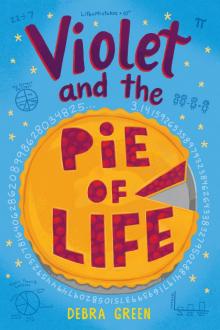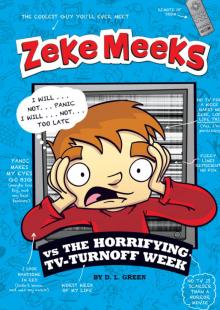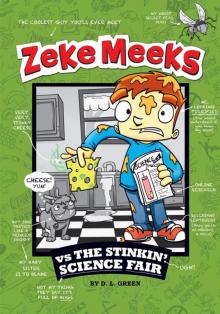- Home
- D. L. Green
Violet and the Pie of Life Page 8
Violet and the Pie of Life Read online
Page 8
“I thought you’d look happier about hearing from your dad,” Ally said. “I bet he’s excited to see you in the play.”
I felt my eyes narrow and my bottom lip curl.
“Are you okay?” Ally asked.
“Fine.” I walked away and sat three rows back, on the other side of the aisle.
But I couldn’t avoid her for long. Soon we were onstage together, rehearsing the scene where Dorothy meets the Cowardly Lion, right before my big song.
I had my part memorized, but Ally kept asking Mr. Goldstein for cues. The third time she did it, I mumbled, “Not again.”
Mr. Goldstein gave me a sharp look.
Ally’s lower lip trembled.
A few seconds later, she had to ask Mr. Goldstein for her line again.
“Shame on you,” he said.
“Shame on you,” Ally said.
“No,” I said, which was not my line. “Shame on you, Ally, for not having your part memorized.”
She made a little choking noise.
“That’s enough, Violet.” Mr. Goldstein’s voice was as sharp as his glare.
Diego said, “For someone playing a lion with no nerve, you sure have a lot of nerve.” He said it jokingly, but no one laughed. No one even smiled.
Then Kimmi Ito/the Wicked Witch said, “Violet, you should mind your own business.”
“It is my business,” I said. “Now I’ll have to tell my dad not to come to the play, because the lead actor doesn’t even know her lines.”
“Stop, Violet. Not another word,” Mr. Goldstein said.
Ally ran off the stage, through the auditorium, and outside.
Kimmi followed her.
A few seconds later, the other girls followed them.
Not me. I stayed onstage and folded my arms over my flat chest, trying to act tough. I probably just looked like I was hugging myself, which I was.
I wanted to run after the girls—run to Ally. I’d tell her I was sorry, tell her I knew she was trying hard, tell her it wasn’t fair to expect her to learn her lines at the same time as me when she had a quadrillion more to memorize, tell her maybe she was right about my father. Even if he couldn’t come to my play, couldn’t he pick me up from school some time?
But I didn’t do any of those things. I was as cowardly as the part I played.
My head pounded and my stomach gurgled, and I didn’t know why I felt so bad. Was it for hurting Ally? Or for everyone at rehearsal hearing me hurt one of the most popular girls at school? Either way, I was a jerk.
Dad:
The play is going terrible. The girl who plays Dorothy doesn’t know her lines. I got in a fight with her because of you. I was defending your honor. Are you honorable? It doesn’t seem very honorable to go out of town the week of your daughter’s play. I tell you more in one email than I tell Mom in a week. But you don’t tell me much at all—like even where you are.
Where are you?
Violet
FIFTEEN
Ally knew most of her lines during Monday’s rehearsal. Supposedly, the girls in the play—except me—had been getting together and helping her. After every line Ally got right, the girls—except me—clapped quietly or gave her a thumbs up.
Even Diego whispered, “You got this, Shorty,” and Ally whispered back, “Thanks, Chubs,” which weren’t insults because Ally wasn’t short and Diego wasn’t chubby. They were more like nicknames between good friends. Or boyfriend and girlfriend.
No one cheered for me during rehearsal. They were probably booing me in their heads and thinking up new nicknames: Maleficent or Cruella de Vil or Lord Voldemort.
Mr. Goldstein kept picking on me. He said, “Positivity, Violet,” and “You’re in the glorious land of Oz. Bask in it,” and “You’re the Cowardly Lion, not the Surly Lion.” Ally gave me a pitying look after he called me surly, which made me even surlier.
I stopped in the middle of pretending to hand Ally a bucket of water to throw over the witch. “Mr. Goldstein, acting would be a lot easier if we had props and costumes.”
“Acting comes from within,” Mr. Goldstein said. “Feel the props. Feel the costumes.”
I kicked the imaginary bucket onto his annoying head and felt a little better.
Text to McKenzie: I hate actors. Mostly those named Ally.
McKenzie:
Violet: Wanna do something Saturday night?
McKenzie: Sure
When rehearsal finally ended, Mr. Goldstein said, “Violet, I need to speak to you about your costume.” He pointed to my phone. “I’ve noticed you’re quite proficient at texting. Please text whomever is picking you up and inform them you’ll be a few minutes late.”
Text to Mom: Be out soon. Costume issue.
Ally gave me another pitying glance before walking out. Then it was just Mr. Goldstein and me, sitting with an empty seat between us about 30 percent of the way back in the auditorium, and a few kids gluing poppies onto a backdrop onstage.
“I was heavily involved in the theater throughout my schooldays,” Mr. Goldstein said. “In high school, we did Othello and Romeo and Juliet. William Shakespeare knew how to write meaty parts!” He sounded infinitely more excited about Shakespeare than I was. That wasn’t hard to do, given my subzero level of interest.
“Mr. Goldstein. Is there a problem with the Lion costume?” I asked.
“Pardon?” He tilted his head. “Oh. Our discussion has nothing to do with your costume. I was attempting to save you from embarrassment in front of the cast.”
My heart sank. He was going to tell me again to show positivity. But how could I when Ally and the rest of the cast hated me, I’d betrayed my best friend by going to her enemy’s house, and my dad was missing? My mom kept reminding me their separation wasn’t my fault, which made it sound as if it was my fault. I mean, she didn’t remind me that earthquakes and global warming weren’t my fault, because those things definitely weren’t.
“When I was growing up,” Mr. Goldstein said, “boys weren’t supposed to reveal their emotions. We could never show fear. And if a boy cried at school, he was done for.”
“It’s still like that,” I said. “For girls too. You can’t cry at school.”
“It’s a shame. So many kids are experiencing difficulties, but you’d never know it from looking at them.”
Mr. Goldstein didn’t know about my difficulties, did he?
He leaned forward. “The beautiful thing about acting is that one is supposed to reveal the character’s emotions. In order to do so, one needs to explore one’s own emotions.”
I nodded. Mr. Goldstein was always telling us to dig deep.
“Rehearsals need to be a safe place for actors. Safe for you and safe for everyone in our little theater family.” He stared at me hard.
“Safe for Ally,” I said softly.
“Right.”
“I didn’t make things safe for her.” My voice had turned whisper-soft. “I wrecked the rehearsal safe place.”
Mr. Goldstein shook his head. “It’s not wrecked. Merely a bit battered.”
“I’m sorry.” I blinked back tears. There was no crying at school.
“I know you’re sorry, Violet. Why don’t you let Ally know that too?”
Why? Because apologizing to a teacher for upsetting rehearsals was a lot easier than apologizing to a friend for upsetting her feelings. (Potential friend? Former friend?) Because for some strange reason, the worse your behavior was and the more you needed to apologize to someone, the harder it became. Because, really, I was a wimp.
“I am highly confident you can do better,” Mr. Goldstein said.
I bit my lip. I wasn’t highly confident. I wasn’t even mediumly confident.
“Positivity, Violet. We’ll build one another back up. That’s what families do.”
“Not all families.” My voice came out as a whisper.
“Theater families build one another up,” Mr. Goldstein said. “That’s another beautiful thing about acting.”
I gave him a small smile.
“If you’re ready to go, I’ll walk you out.”
I nodded.
Before we left, Mr. Goldstein headed toward the stage and told the crew, “Those poppies look lovely.”
“Great job,” I said.
* * *
Grandpa Falls-Apart sputtered a few times before Mom got him started and drove out of the parking lot. “Did you solve the costume issue?” she asked.
“Uh-huh.” My voice sounded small.
At the stop sign she usually rolled through, Mom came to a complete stop and stared at me. “Were there other issues too?”
“No,” I murmured. I leaned against the car window and closed my eyes to get some peace. My brain kept picturing everyone cheering on Ally and giving me mean looks.
The ride home seemed to take forever. I opened my eyes. We weren’t on our way home. “Where are we?”
“Heading for Bonzo’s Barbeque,” Mom said.
“We are?”
Mom shrugged. “I know you like it. And we haven’t been there in a long time.”
“That’s because you complained about it every time Dad wanted to go.”
“Not every time,” Mom said.
I thought about it and did the math. It was more like 60 percent of the time. “Okay. Well, thank you.”
“You’re welcome.”
* * *
After we ordered our food, Mom asked how the play was going.
“Fine,” I said.
“You seemed upset when I picked you up from rehearsal.”
I put my napkin on my lap and stared at it. “Everything’s fine.”
“I wish you would talk to me more,” Mom said. Her voice sounded sad—yearning, as Mr. Goldstein would say.
Telling Mom I’d been mean to Ally would make her even sadder. I took out my phone.
“Remember our rule,” Mom said. “No phones at dinner.”
“It’s not our rule. It’s your rule. Dad never cared.”
“Put away your phone,” Mom said gruffly.
I did. Then I looked around the restaurant. Two tables over, a couple laughed and chatted away like they were best friends, while their toddler sat in a booster seat with an iPad. I wished they were my parents.
Last Thanksgiving, my little cousin Liam had fallen asleep in his booster seat at the table. When my Aunt Amber started unbuckling him so she could carry him into the guest room, he’d woken up and said, “Where’s my pie?”
Everyone around the table had laughed. Grandma had said, “He’s got that Summers pie-loving gene,” and everyone laughed again. Thanksgiving with Dad’s relatives meant lots of laughing.
That’s what I yearned for now—a family. I’d fractured our middle school theater family, and you could hardly call the forced duo of Mom and me a family. I wanted a real family with Mom and Dad and me, like I used to have.
The server brought our food: Boss of All Biscuits, Slab o’ Ribs, Bacon & Bean Heaven, and Cream de la Cream Coleslaw for me. Plus peach pie for dessert. Mom got a boring salad.
I pushed away the bottle of Bonzo’s World-Famous, Top-Secret Sauce, grabbed the bottle of ketchup, and slathered it on my ribs and beans. “You know, Mom,” I said. “If you had gone here with Dad instead of complaining about this place, or—”
“Or!” Mom cut me off in a voice as sharp and steely as my steak knife. “Maybe if your dad had—” Then she cut herself off. She let out a big breath and said, “Just stop, Violet.” The breath hadn’t been big enough to let out the anger in her voice.
“No, no, no!” the boy in the booster seat shouted as his mother tried to take the iPad from him.
The dad grabbed the iPad, unbuckled the booster seat, picked up the little boy, and held him tight until he quieted down. The dad said, “I never get any peace.”
“Baloney!” the mom said. “You hide out in your office all day.”
“Mom,” I said as I cut my ribs, gripping the knife like the boy had gripped the iPad. “You just told me you wished I’d talk to you. I did, and now you’re all upset.”
“Sometimes it’s easier to write down your feelings.” Mom’s voice had returned to pity mode. “Would you like to email me?”
“What? That’s totally dumb.” It came out: “Wuh? Thaz towy duh,” because my mouth was full.
“Fine!” Mom was no longer in pitying mode. She seemed mad. If Mom wrote down her feelings tonight, they would be 85 percent angry and 15 percent pity.
Mom could join the club of people who were mad at me: Ally; everyone else in the play; Dad, probably, after the last email I’d sent him. I was a horrible person.
“Do you know what my favorite food is?” Mom asked.
I shrugged.
“Sushi.”
I made a face. “Raw fish. Gross.”
Mom sighed. “That’s what your father said whenever I brought it up. He would never go out for sushi with me.”
I usually liked being compared to my dad, but not when it meant both of us acted mean to Mom. Had I gotten my horribleness from him? He was the one who’d disappeared. Mom was the one who’d taken me to Bonzo’s.
“I bet you’d like sushi once you tried it,” Mom said.
I would bet a lifetime of allowance money that I would not.
“Do you want to go to a sushi restaurant some time?” Mom asked hopefully.
“Sounds good,” I lied.
Apparently, I wasn’t a completely horrible person after all.
* * *
Early the next morning, I woke to sounds I hadn’t heard in months. They were muffled, but I recognized them.
I turned on my phone. 2:48 a.m. Then I clicked on its flashlight, got out of bed, and slinked to the hallway. I stood there, frozen, listening to Mom’s rhythmic sobs. I felt grateful, in a guilty way, that Mom’s bedroom door was closed.
The steady sobs didn’t let up. Mom did everything steadily, even crying. That’s how I knew she would stop crying eventually. And as soon as her alarm went off, she’d get out of bed, splash water on her face, brew herself a big mug of coffee, remind me to get ready for school, and drive me there like everything was A-OK.
But she’d stop crying sooner if I called out to her or knocked on her door.
I didn’t. I didn’t make a sound. I didn’t want to mother my mother. I’d never needed to. Mom was the steady one. Thankfully.
I skulked to my room and shut my door.
Then I turned on the light, took out some paper, and sat at my desk.
I ripped up my dumb tries at notes and threw the tiny pieces in the trash.
Then I grabbed my phone.
Text to Ally: I’m sorry.
SIXTEEN
HOW I SPENT MY MORNING
USUAL Things
I checked my email as soon as I woke up. Nothing from Dad.
When I rushed into the kitchen for my toast and peanut butter breakfast, Mom was sitting at the kitchen table, dressed and dry-eyed and clutching a large mug of coffee.
As I got out of the car, Mom told me to have a nice day.
RARE Things
I got ready for school quickly without Mom nagging me once.
We left for school almost fifteen minutes early.
I thanked Mom for driving me.
As soon as I got to school, I went right to Ally’s locker. Actually, I stood about five feet away at a forty-five-degree angle so I wouldn’t seem like a weird stalker, even though I was.
When Ally came by, I said, “Oh, hey,” in a fake cheerleader voice unfortu
nately like my mom’s.
“I got your text,” Ally said like someone would say I got dog poop on my shoe.
“I’m sorry,” I said, which was dumb, since I’d already texted her those two words (or three words if “I’m” counted as two words) and she’d just told me she got my text.
Ally wrinkled her nose as if she could smell the dog poop. “You texted me at, like, three in the morning.”
I sighed. I couldn’t even apologize right. “Oh, right. I hope the text didn’t wake you up.”
She walked right by me and faced her locker. “I didn’t see it till I was eating breakfast.”
“Phew! Because, you know, I’ve already apologized two times—the text and just now.”
Ally didn’t say anything, maybe because she was concentrating on twisting her combo lock. Not concentrating hard enough though, because her locker didn’t open.
She spun the lock around and tried again. This time, the locker opened.
I moved closer to her and said, “But I would have apologized a third time if I had woken you up.”
She took out Treasure Island and dropped it into her backpack. The thud sound stuck out in her silence.
“Because waking you up would have been a different thing to apologize for.”
She dug through her backpack and put some notebooks in her locker.
“A whole separate apology,” I went on.
I wasn’t used to the silent treatment. McKenzie was never silent. Neither were my parents. Well, Dad had gone silent.
Ally closed her locker, spun the lock, and walked away without saying a word.
I sort of understood why my silences drove my mom up the wall.
If I had pen and paper handy and fifteen minutes to focus, I would have made a flowchart of my options:

 Violet and the Pie of Life
Violet and the Pie of Life Zeke Meeks vs the Horrifying TV-Turnoff Week
Zeke Meeks vs the Horrifying TV-Turnoff Week Zeke Meeks vs the Stinkin' Science Fair
Zeke Meeks vs the Stinkin' Science Fair